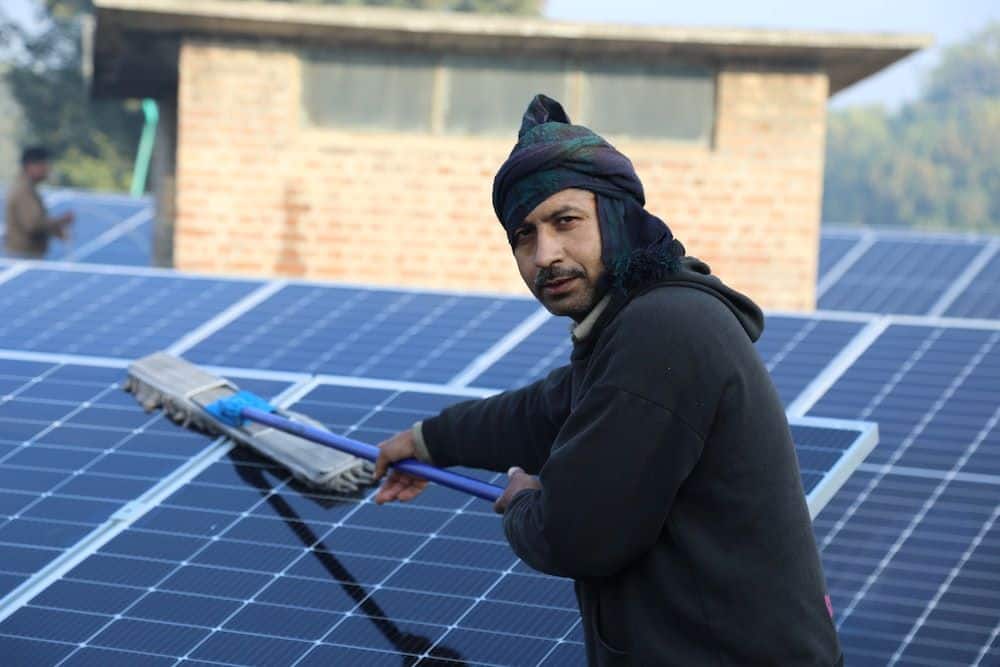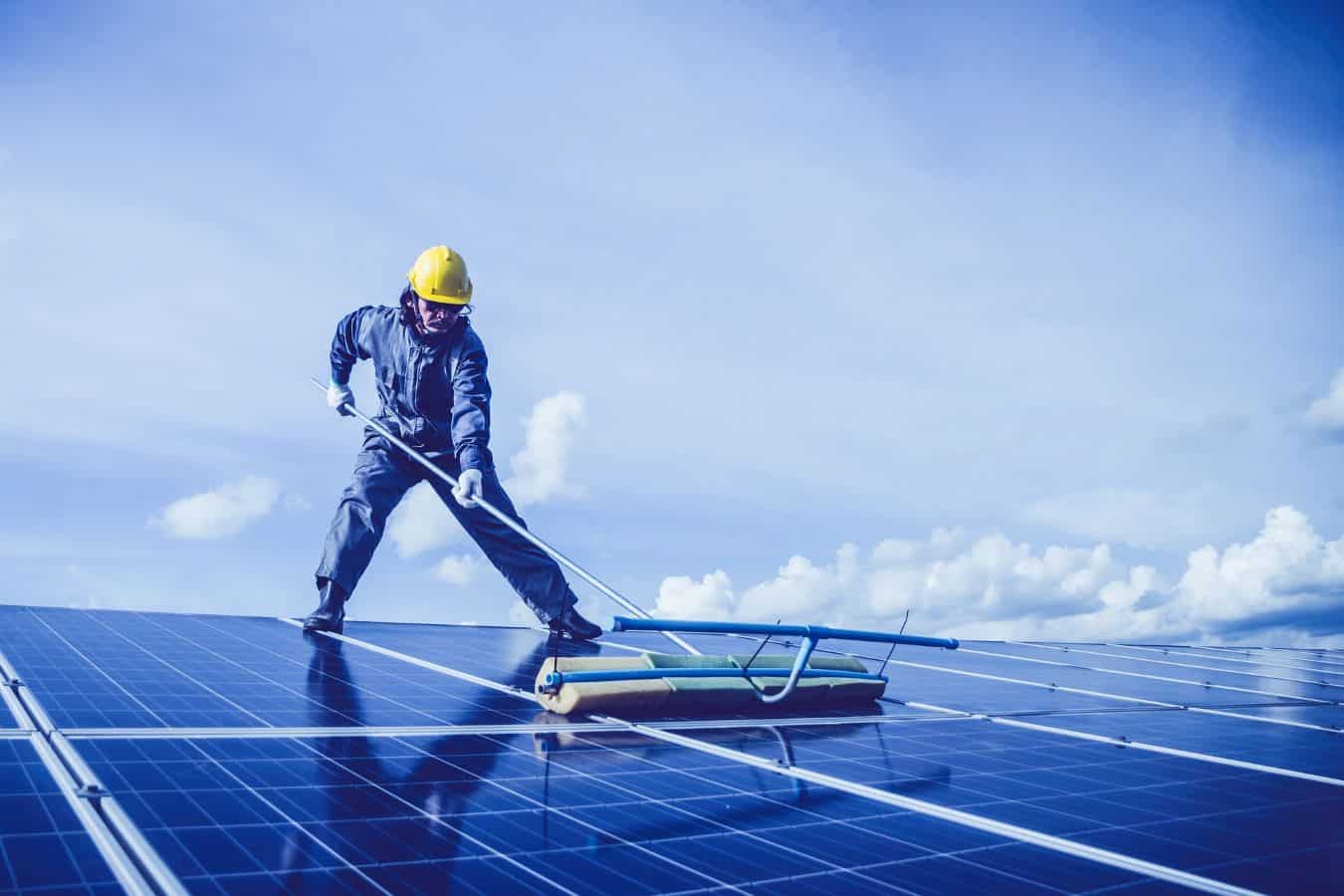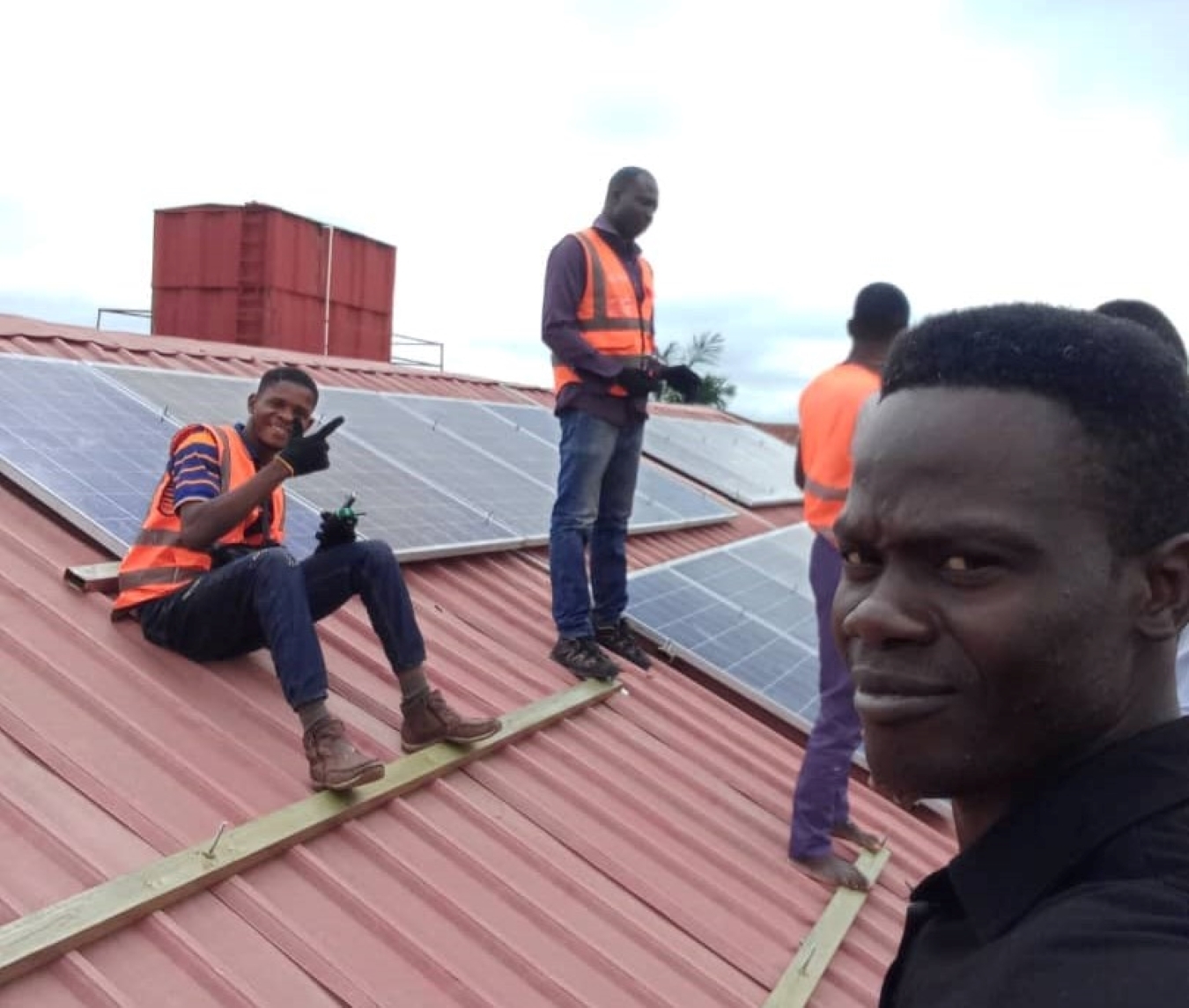Solar panel cleaning is necessary at least once every year. Read through to learn how safely you can clean your solar panels and the end results.
Do you need information on how to clean your solar panels to maintain their optimum power efficiency?
Then, read through this article to get all the details on how to clean your solar panels.
In this article, I’ll walk you through all the steps on how to clean your solar panels.
These will help you to ensure that your solar panels perform at their best.
However, in order to ease your reading, care has been taken to present this article in sections. The first section covers the overview of solar panels.
Just after the overview, I will give a detailed explanation of the pros and cons of solar panels.
In the section that follows the pros and cons, you’ll get to understand how solar panels work.
Before you attempt to clean your solar panels, there are some factors to consider. These will be the next in line after the explanation of how solar panels work.
Furthermore, as you read on, you’ll find the most important part of this article – the step-by-step guide on how to clean your solar panels.
Lastly, I will provide answers to some frequently asked questions, and then wrap it up with my final thoughts.
So, read on as I take you through the whole thing.
How To Clean Your Solar Panels: Overview
Solar panels, also known as photovoltaic panels or PV modules, are devices that convert sunlight into electricity through a process called the photovoltaic (PV) effect.
They consist of a collection of photovoltaic cells, which are made of semiconductor materials such as silicon.
Usually, when light strikes the cell, it creates an electric field across the layers of the cell, causing electricity to flow.
These devices are typically installed on rooftops or in open spaces where they can receive maximum exposure to sunlight.
They can be used to generate electricity for homes, businesses, and other applications.
The amount of electricity that a solar panel can generate depends on several factors, including the size of the panel, its efficiency, and the amount of sunlight it receives.
Of course, the use of solar panels has several advantages. For instance, solar energy is a renewable resource, meaning it can be replenished naturally and indefinitely.
Again, they don’t produce emissions or pollutants, which makes them a clean energy source. They also have a low operating cost and require minimal maintenance.
Without a doubt, solar panels have become increasingly popular in recent years as the cost of solar technology has decreased.
Many governments and utilities today offer incentives and subsidies for installing solar panels. That’s super amazing.
How To Clean Your Solar Panels: A Step-By-Step Guide

Cleaning solar panels is a simple process that can be done using basic tools and materials. Here is a step-by-step guide on how to clean solar panels:
Step 1: Shut Down Your Entire System
Before starting the cleaning process, make sure to turn off the solar panel system to avoid any electrical shock.
Also, make sure to use proper safety equipment, such as gloves, safety glasses, and a stable ladder.
If the panels are located on the roof, make sure to take appropriate safety measures when climbing up.
Step 2: Inspect The Panels
Check the panels for any signs of damage, such as cracks or scratches. Cleaning a damaged panel may cause further damage, so it’s important to fix any damage first before cleaning.
Step 3: Choose The Best Time
Before you decide on cleaning your solar panels, make sure the timing is perfect. In other words, you should choose the best time of the day or week to do the cleaning.
Choosing the best time of the day, such as the early morning, can help to eliminate any possible damage to your panels.
That’s the perfect time to do the cleaning, because by then the dew that settles on the panel can help soften the dirt, thus making the cleaning a lot easier.
However, in times when the weather is hot, the water used on the panel can easily evaporate and leave dirt marks on it.
Of course, that’s not the result you’d like to have after a long and stressful cleaning task.
Step 4: Remove Debris And Dirt
The next thing to do is for you to remove the debris and dirt from the panel.
Use a soft-bristled brush or a squeegee to remove any debris or dirt from the surface of the panels. Be gentle while cleaning to avoid damaging the panel surface.
However, if the debris is hard to remove, use a mild soap solution or a cleaning product specifically designed for solar panels.
Step 5: Rinse The Panels
After removing the debris and dirt, rinse the panels with clean water using a hose or a pressure washer.
Make sure to rinse the panels thoroughly to remove any soap or cleaning product residue.
Step 6: Dry The Panels
Use a soft, dry cloth or a squeegee to dry the panels. Avoid using abrasive materials or rough towels that can scratch the panel surface.
Dry the panels completely to avoid leaving any water spots or streaks.
Step 7: Check The Panels
After cleaning, inspect the panels to ensure that there is no remaining dirt or debris on the surface. Also, check the connections and wiring to make sure they are secure and in good condition.
Step 8: Turn On The Power
After cleaning and drying the solar panels, turn on the system’s power and monitor its performance to ensure that everything is working perfectly.
Regular cleaning can help maintain the efficiency and longevity of the panels, thus ensuring that they generate maximum electricity.
Always remember to apply proper safety measures and avoid using harsh cleaning products or abrasive materials that can damage the panel surface.
How To Clean Your Solar Panels: Pros And Cons
While solar panels offer several benefits, they also have some drawbacks. In this regard, I will provide a detailed explanation of the pros and cons of solar panels.
Pros
Renewable and Clean Energy Sources
Solar panels generate electricity from sunlight, which is a renewable and clean source of energy.
This means that solar power does not produce greenhouse gases, air pollutants, or other harmful emissions that contribute to climate change and air pollution.
Unlike non-renewable energy sources like coal, oil, and natural gas, sunlight is abundant and does not produce harmful emissions when used to generate electricity.
This makes solar panels a sustainable source of energy that can help reduce our reliance on fossil fuels.
Low Maintenance
Another advantage of owning a solar panel is the low cost of maintenance. Of course, solar panels have no moving parts, so they require very little maintenance.
You don’t need to spend regularly to keep them running smoothly, as long as they remain unaffected by environmental factors.
Once installed, they can last for over 25 years with minimal upkeep, making them a cost-effective long-term investment.
Reduces Energy Bills
Perhaps you’ve been using non-solar generated energy and are wondering why your energy bills keep increasing.
Well, you shouldn’t do anything less. As long as you keep making use of gas-generated energy, you’ll most certainly keep having high utility bills.
Alternatively, with solar-generated energy, you can expect to spend less on energy bills. Solar panels can reduce energy bills by generating electricity during daylight hours.
This can significantly reduce or even eliminate your monthly electricity bill, depending on the size of your solar panel system and your energy usage.
Thus, you can channel the money it saves you into other important areas.
Increases Property Value
This is perhaps one of the biggest advantages of installing a solar panel in your home today.
Not too many people know that installing solar panels in their homes can actually increase the value of their homes.
In fact, it’s been confirmed that homes with solar panels sell four percent higher than those without them.
So, if you have a solar panel installed on your property, believe me, you’ll be saving a large amount of money in the long run, while also increasing its value.
Solar panels are considered a long-term investment that can potentially pay for themselves over time.
Incentives and Rebates
As I said earlier, many governments and utility companies today offer incentives and rebates for installing solar panels.
These incentives can reduce the upfront costs of solar panels and provide additional financial benefits over time.
Environmental benefits
In our world today, where people go about their various daily activities that, in one way or another, affect the ecosystem, solar panels help reduce our carbon footprint by producing clean energy that does not release greenhouse gases or other harmful pollutants.
By using solar panels, we can help combat climate change and protect our planet for future generations.
Cons
They Are Very Expensive
One of the major drawbacks of solar panels is that they are very expensive.
Despite the decrease in the price of solar technology over the years, it still costs quite a great of wealth for its installation.
On average, you can expect to pay around $14,000 for the complete installation of the unit.
Although investing in a solar panel is worth it in the long run, the initial payment can be discouraging.
It is because of this that many homeowners decide against installing it in their homes.
It Depends On the Sunlight
The amount of energy produced by solar panels is highly dependent on the weather conditions. On cloudy days, the amount of energy produced is significantly lower than on sunny days.
Similarly, during the winter months, when the days are shorter, less energy is produced than during the summer months.
Storage Challenges
Solar panels produce energy during the day, but many households consume the most energy in the evenings and at night when the sun is not shining.
This means that energy produced during the day needs to be stored in batteries or other energy storage systems to be used later.
However, these storage systems can be expensive and add to the overall cost of the solar power system.
Land Use And Visual Impact
Solar panels require a significant amount of space to be installed. This can be a challenge for those living in urban areas with limited space.
Additionally, some people may not find solar panels aesthetically pleasing, and the installation of large solar farms can have a visual impact on the surrounding landscape.
Maintenance Costs
While solar panels are generally low maintenance, you still need to carry out periodic cleaning and inspection on them to ensure they perform at their best.
Also, there are some rare cases where panels need to be replaced due to damage or wear and tear, which can add to the overall maintenance costs.
Manufacturing Environmental Impact
Although solar panels themselves are environmentally friendly, their manufacturing process can have a negative impact on the environment.
Again, their manufacturing process can be really complex and often leads to waste.
Admittedly, the production of solar panels requires a significant amount of energy and resources, which can contribute to greenhouse gas emissions and other environmental issues.
How Solar Panels Work
The workings of a solar panel are in stages, and I’ve tried to simplify the explanation for easy assimilation. Below is a detailed explanation of how solar panels work.
The first stage is the stage of absorption of sunlight. Usually, when sunlight hits a solar panel, it is absorbed by the PV cells within the panel.
The cells are designed to absorb as much sunlight as possible, so they are often coated with materials that increase their light-absorbing capabilities.
The next phase is where an electric field is created. The absorption of sunlight creates an electric field within the PV cells.
This electric field separates the positively charged atoms from the negatively charged atoms, creating a flow of electrons.
After that, the flow of electrons created by the electric field is captured by a grid of conducting material that is embedded within the solar panel.
This material is often made from a metal such as aluminum or copper.
Furthermore, what follows after that, is the conversion of DC to AC. Often, the flow of electrons captured by the conducting material is in the form of direct current (DC).
However, most homes require alternating current (AC) to power their appliances and electronics.
Therefore, an inverter is mostly used to convert DC electricity into AC electricity.
The last stage is where electricity is distributed to your entire household.
At this point, any excess electricity can be sent back to the utility company for use by other customers.
This is accomplished through a process called net metering, which credits the solar panel owner for any excess electricity they produce.
Frequently Asked Questions On How To Clean Solar Panels

Solar panels, also known as photovoltaic panels or PV modules, are devices that convert sunlight into electricity through a process called the photovoltaic (PV) effect. They consist of a collection of photovoltaic cells, which are made of semiconductor materials such as silicon.
When cleaning solar panels, it is important to be cautious to avoid damaging the panels or harming yourself. Do not use abrasive materials or harsh chemicals on your solar panels. Instead, use a soft cloth or sponge with plain water to clean solar panels.
No, solar panels require sunlight to generate electricity. Although, solar panels can still produce some electricity even on cloudy days, the amount of energy generated will be significantly less compared to bright, sunny days.
No doubt, solar panels are a reliable and long-lasting source of clean energy, but like any other technology, they can be susceptible to certain conditions that can lead to their failure. For instance, physical damage, shading, corrosion, and extreme temperatures could all ruin the life of a solar panel.
The best thing to clean solar panels with is plain water and a soft cloth or sponge. It is usually advisable to avoid using harsh chemicals, abrasive materials, or anything that could scratch or damage the surface of the solar panels.
My Final Thoughts On How To Clean Your Solar Panels
Solar panels are, of course, an excellent source of renewable energy, but they require regular maintenance to ensure they operate efficiently.
Cleaning solar panels is a crucial part of solar panel maintenance, as it ensures that maximum sunlight is absorbed and converted into electricity.
Once again, I must say, that cleaning solar panels is a pretty straightforward process that requires the right tools and cleaning products.
Moreso, cleaning your solar panels regularly helps ensure that they operate efficiently and effectively, providing maximum energy output.
In this article, we took our time to document, and also guide you on how to clean your solar panels, and I sincerely trust that the information provided here will be worth the time spent reading it.
I hope you found this article on ”How To Clean Your Solar Panels” very helpful.
Please, share your thoughts with us by filling out the “Leave A Reply” form at the end of this page.
To read more articles like this, please visit :
References And Further Reading
forbes.com – Solar Energy Pros And Cons
e-architect.com – Things To Consider Before Cleaning Your Solar Panel




